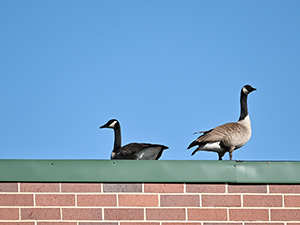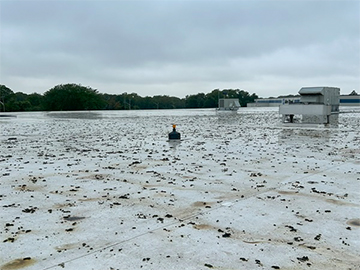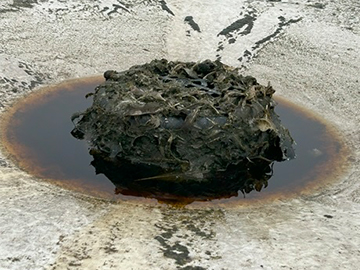How to Keep Geese Off Commercial & Industrial Rooftops
Aug 20, 2024
Millions of Canada geese are currently migrating south to warmer climates, and will continue to do so through late November. During fall migration, geese tend to form foraging flocks, which can be hundreds strong. These flocks travel, eat and loaf in the same areas – including the rooftops of commercial and industrial properties.
Why Rooftops Are Attractive to Geese
Canada geese prefer to rest and loaf on elevated surfaces, as they provide an excellent vantage point from which to observe potential threats and offer protection from ground-based predators (e.g., coyotes, foxes). Canada geese are attracted to roofs on commercial and industrial properties, in particular. These roofs, which are typically large and mostly flat, provide ample space for large flocks and sufficient space for takeoff and landing.
Geese are nocturnal, so they tend to congregate on roofs at twilight and at night to rest and sleep. As the temperature changes throughout the fall, geese often favor certain types of roofs:
- White Roof Membranes: Geese prefer white roofs earlier in the fall migration season (August to September) because they are cooler than darker roofs
- Black Roof Membranes: Geese prefer black roofs later in the fall migration season once the weather gets colder (September to November) because they absorb and retain heat better than lighter colored roofs
Roof Problems Caused by Geese
Canada geese can cause a variety of damage to roofs – regardless of the type of property.
1. Short- & Long-Term Structural Damage
Canada geese have webbed feet with small claws. Geese often use their claws during takeoff and landing, which can tear and rip lower-mil roof membranes. These tears can lead to immediate leaks and, if left unaddressed, potentially more expensive repair or replacement costs. Geese also leave highly acidic droppings in their wake, which can erode roofing materials over time if not removed in a timely manner.
2. Clogged Drains & Gutters
During the fall migration, goose droppings and feathers accumulate and can easily clog rooftop drains and gutters, leading to water pooling on the roof. Standing water can cause significant damage, including leaks, mold growth, and in extreme cases, roof collapse.
3. HVAC Systems
Geese and their feathers, droppings and other debris can obstruct rooftop HVAC systems, which can cause the systems to malfunction or break down entirely. Goose debris can get sucked into air intake vents and reduce the efficiency of HVAC systems, potentially leading to expensive repairs or, in extreme cases, full replacement.
4. Health Risks
Goose droppings are more than just a cleaning hassle; they can pose serious health risks. Droppings can harbor bacteria, parasites and viruses that can be harmful to humans. When droppings dry, they can become airborne, and potentially lead to respiratory issues for people nearby. For certain businesses, especially those in the food industry, this can result in a health code violation.


Deter Geese from Your Roof with Automated Lasers
Luckily, there are ways to safeguard your property’s roof and roof assets. One of the most effective forms of protection is an automated laser: the latest technology in bird deterrence and harassment. Automated bird lasers, like the AVIX Mark II, harass nuisance geese but do not interfere with normal property uses. The automated system and extensive range of the laser beam (over 1,000 yards) provide effective nuisance bird harassment on an ad hoc, seasonal, or continuous basis.
Automated laser used to deter geese from a rooftop
Safeguard Your Roof from Geese with Wild Goose Chase Indy
If you notice geese loafing or congregating on your roof, act quickly to protect your assets. For the best outcome, contact an expert with deep knowledge of bird biology to assess your property and implement the most effective deterrent strategy – which can include an automated laser.
The Wild Goose Chase Indy team has over 26 years of experience managing Canada geese – and other nuisance birds – on commercial and industrial properties. For more information about how our team can deter birds from your roof, or to schedule a site evaluation, contact us.


 0
0
